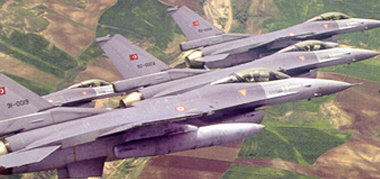Israel airstrikes on Gaza kill at least 200
 Gaza City / Tel Aviv - Israel unleashed waves of airstrikes against the Gaza Strip Saturday, targeting Hamas installations and personnel, and killing 200 people, in a long-expected retaliation for ongoing rocket fire from the salient.
Gaza City / Tel Aviv - Israel unleashed waves of airstrikes against the Gaza Strip Saturday, targeting Hamas installations and personnel, and killing 200 people, in a long-expected retaliation for ongoing rocket fire from the salient.
More than 275 people were injured in the strikes, Palestinian medical officials said, noting that the fatality toll was the highest in the Gaza Strip since the 1967 Middle East War.
The attacks, although an expected response to the over 180 rockets and mortars the Hamas military wing and other Gaza militant groups have fired at Israel since the end of a truce on December 19, came as a surprise on Saturday, as previous Israeli media reports had not expected a decision to strike before Sunday.
Hamas spokesman Fawzi Barhoom said Israel would pay a "high price" for its actions and by late afternoon more than 30 rockets and mortars had been launched at southern Israel. One person was killed when a rocket struck a house in the town of Netivot, over 10 kilometres west of the Strip.
"We will violently retaliate, God willing, and will let the (Israeli) occupation know that it has thrown itself into fire by attacking Gaza," Abu Obaida, a spokesman for the Hamas military wing, said.
Barhoom called for the rocket fire on Israel to intensify and slammed what he called "the silent and still Arab position on Gaza massacre."
Israel however indicated that Saturday was just the first day of "Operation Cast Lead", as the Israeli action is called.
"The operation will be deepened and widened as required," Israeli Defence Minister Ehud Barak said in a brief news conference late Saturday afternoon.
"We will not let terror harm our soldiers or citizens," Barak said. "The time has come to act."
He said more than 150 Hamas activists were hit and Israeli media reported that more than 60 planes and helicopters took part in the attacks, a figure Israeli military spokesmen refused to confirm.
The military did confirm witness and other reports from within the Gaza Strip that at least 30 simultaneous aerial missile strikes targeted Hamas military facilities and fighters belonging to Hamas.
Most of the dead were members of Hamas security forces, including their police chief Tawfiq Jaber, the chief of Hamas' Security and Protection Service Ismail al-Jabary, and Central Gaza Strip governor Abu Ahmad Ashour.
All the Hamas' security installations in the Gaza Strip were bombed, and columns of black smoke could be seen rising from dozens of locations across the territory.
Artillery fire was also reported against Palestinian militants firing rockets into Israel. Witnesses in Gaza said Israeli artillery fire struck at militants who had fired rockets into Israel west of the town of Beit Lahiya, in the north of the Gaza Strip, injuring several militants.
Civilian vehicles were helping ambulances in ferrying the wounded to Gaza's hospitals, and hospitals were urging civilians to donate blood, Palestinian medical sources said.
Egypt opened its borders with Gaza to evacuate casualties and treat them into its hospitals.
Israel's Red Cross equivalent, Magen David Adom, placed its staff in locations near the Gaza Strip on high alert and placed 200 ambulances on standby.
A statement released by the IDF said that the targets included "Hamas terror operatives that operated from the organization's headquarters, training camps and weaponry storage warehouses."
All the targets were "were located by intelligence gathered during the last months," the statement said, and added that the attacks would continue "according to operational assessments held by the Chief of the General Staff."
"The purpose of the operation is to minimise the firing of rockets against Israeli communities from the Gaza strip and to create an improved security environment over the long term," Israeli military spokesman Captain Benjamin Rutland said.
Yasser Abed Rabbo, a spokesman for Palestinian President Mahmoud Abbas, called for an immediate end to "Israeli aggression against the Gaza Strip."
"We are still expecting the worst," he said. "This aggression clearly is not a single act, rather it has a broader goal and therefore we should act quickly," he added. (dpa)